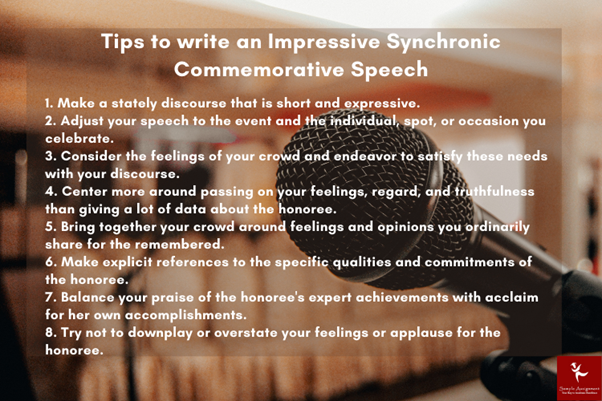
The principle aim of the commemorative speech is to remember or honor an individual, group, place/organization, thought, landmark, or occasion. There are many synchronic commemorative speech topics that are utilized on different occasions. Your role as a speaker is to feature the events’ purposes, express the opinions held by everybody associated with the festival, remembrance, and accolade, and excite your crowd with a moving discourse. Utilize the standards of stylized/extraordinary events and dedicatory talking illustrated here to assist you with composing and conveying your memorial discourse.
Tips to Write Synchronic Commemorative Speech

- Make a stately discourse that is short and expressive.
Except for those occasions when you are the essential speaker, keep your stately discourse short, from one to five minutes in length. In light of this quickness, pick thoughts and words that will have an emotional impact and practice your conveyance so you can pass on the fitting significance and sensation of your discourse. Additionally, utilize a climactic organizational example and sound, especially while finishing the speech.
- Adjust your speech to the event and the individual, spot, or occasion you celebrate.
Base the substance, language, and conveyance of your speech upon the idea of the event, the character of the honoree or the personality of the occasion recognized, and your crowd's opinions towards the praised individual or experience. For example, in the event that you are introducing a lofty honor like a prestigious award at an award ceremony or giving a commemorative speech on a famous person, use a conventional style of language and a composed manner of speaking. Be that as it may, assuming you are giving a commemoration discourse to dear companions at a little supper or a tribute for the benefit of a gregarious companion, utilize casual language and a more nostalgic or unconventional tone.
- Consider the feelings of your crowd and endeavor to satisfy these needs with your discourse.
Decide if your speech ought to make a merry state of mind, pass on regard for the honoree's achievements, permit your crowd to lament, or humor your crowd and user requests and a style of language and talking that will satisfy these requirements.
- Center more around passing on your feelings, regard, and truthfulness than giving a lot of data about the honoree.
To the extent that most of your crowd will be comfortable with the honoree, your fundamental purpose isn't to illuminate or convince but to motivate and celebrate. Notwithstanding, you will, in any case, need to reacquaint your crowd with the accomplishments of the celebrated so you can reinforce their regard and appreciation for the individual, spot, or occasion being praised. To accomplish both the motivations behind illuminating and moving your crowd, attempt to be imaginative with your clarifications and depictions rather than instructive.
- Bring together your crowd around feelings and opinions you ordinarily share for the remembered.
For example, portray an individual encounter including the honoree, quote an articulation she generally utilizes, or portray one of her ordinary exercises that portrays a worth or normal for the honoree with which everybody can identify. In like manner, attempt to portray the energy, frustration, and kinship felt by individuals who have cooperated for a purpose, association, or occasion so they and others can re-experience these sentiments through your discourse.
- Make explicit references to the specific qualities and commitments of the honoree.
Don't by and large express that the honoree has a decent person and numerous accomplishments; rather, refer to explicit instances of the honoree's ideals and achievements, so your crowd perceives her special characteristics and commitments. In addition, to carry more noteworthy understanding into the honoree, depict a moderately obscure accomplishment or proposition a unique translation of one of her credits.
- Balance your praise of the honoree's expert achievements with acclaim for her own accomplishments.
In spite of the fact that your discourse should focus on the honoree's expert work, you ought to likewise make reference to those exercises connected with the honoree's very own life that she, herself considers significant. For example, portray her everyday life, local area exercises, or work with non-benefit associations.
- Try not to downplay or overstate your feelings or applause for the honoree.
Try not to fall back upon abused adages or prosaic proclamations to mirror your feelings. Rather, attempt to communicate your sentiments in a more imaginative manner. Never, notwithstanding, endeavor to give a discourse assuming that you will not be able to control your feelings. This just causes an abnormal circumstance for both you and the crowd and redirects consideration from the remembered. Ultimately, don't misrepresent your acclaim for the honoree with the eventual result of humiliating her or causing your crowd to feel awkward.
Synchronic Commemorative Speech Topic Ideas
Synchronic speeches are speeches given in real-time. This can be impromptu as well, but mostly the speaker is informed beforehand to prepare a speech. Commemorative Speeches are given to celebrate an event or grieve the death of a person. According to the occasion, there can be many topics. A few of them are:
- Paying tribute to your parents
- Thanking Covid Warriors
- Paying respect to the Constitution
- Celebrating Personal Accomplishments
- Winning an Award
- Publication of your book
- Paying tribute to a famous person
- Importance of Honesty in today’s world
- Remembring a moment from a deceased’s life
- Paying tribute to human attributes
- Importance of Education/Teachers
- Celebrating the values of a religion
- Examples of inspirational incidents
- Character Strength
- Dreams
- Act of humility
- First trip abroad – what you've learned about the outside world or about the US by taking a step back and evaluating. If you went as an exchange student, this topic could be used to highlight the positive aspects/strengths of your university/academic community.
The list is endless.
If you are looking for assignment help experts, you are at the right place. Please fill the form right on our website to get in touch with our experts and book an assignment. Receive a well-researched assignment within the deadline using our assignment writing service—score high distinction grades on a low budget. We also give amazing offers and discounts on bulk orders.
Get assistance with your Commemorative Speech Assignment using our assignment writing service.









Loved reading this Blog? Share your valuable thoughts in the comment section.
Add comment